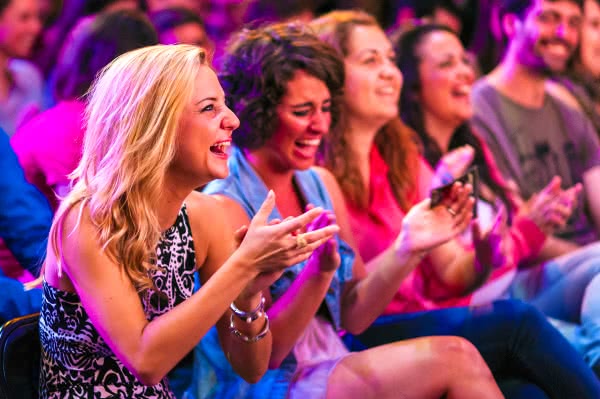A successful comedy event that runs smoothly on the night comes down to meticulous planning. And lots of it.
Whether you are hosting a one-off corporate event or a regular comedy show, careful consideration of all the factors affecting the performers and the audience will make for an evening remembered by everyone for the right reasons.
Because there’s really nothing funny about a badly organised comedy event.
Here are some of those key considerations.
Laying out the venue
Once you have selected and booked a venue for your event, you will need to work with the venue manager to ensure it is arranged appropriately for live comedy.
Whether you arrange the seating theatre style (in rows) or cabaret style (with tables) you will want to have as many people near the stage area as possible. What can make a venue difficult for a comedian to play is for the audience to be spread out and scattered around the room. The more people you have concentrated towards the stage, the greater your chances of engaging the audience and the performers.
If your event is unlikely to be sold out, arrange the room cabaret style instead of theatre style, which will make it look fuller. Remove any chairs that you definitely will not need, and if you’re unsure how many people will be attending the event, mark the rows furthest from the stage as ‘reserved’ so people will have to sit towards the front of the room. As the events gets busier, you can then remove the reserved signs and release the seats.
Also mark as ‘reserved’ any spaces where you don’t want people to sit, especially bench seating against walls.
Think about how people will enter the room and take their seats before the show and after any intervals. Very long rows make it difficult for people to get to get to their seats, so leaving a middle aisle will enable your attendees to move around more easily. Don’t make the aisle too wide, however, or it will look like the comedians are performing to a gap.
The stage area
This will be the focal point of the performance, meaning it is crucial that your attendees can see and hear the comedians clearly.
The performers should be slightly raised, so if the venue does not have a stage as such, you should make an effort to acquire one. Even if the stage is only ten inches high, it will draw the audience’s attention to the comedians and give them some status above the audience.
Avoid a really high stage in a small or medium-sized venue, as the people at the front of the room will have to strain to look up at the performers.
A dark backdrop behind the comedians is suggested, preferably a theatre-like curtain. This needs to be dark and non-reflective, as your stage lights will be pointed directly at it.
Stage lighting
Lighting the performers well is crucial, and yet, I have been to many corporate events where this was simply overlooked. Why would the audience’s attention be drawn to the performers if the audience is just as brightly lit?
You will need at least two powerful spot lights pointed at the stage. Position the lights at symmetrical angles to the stage, for example 45 degrees and 135 degrees. Avoid putting lights directly in front of the stage as this will make it very difficult for the acts to see.
Check that your lights are positioned correctly by having someone stand on the stage to see if they are well lit. Ask them to move around to see if there are any ‘dead spots’, where the performer is dark, that you need to eliminate.
When the show is about to start, dim the venue or ‘house’ lights a little. This will signal to the audience that the show is about to start and that they should take their seats. Do not lower the house lights too much before the show and during the intervals, as this will make it difficult for people to find their seats.
Sound
Good sound is also crucial to the performance. Most venues will have an in-house sound system that you can connect a microphone to and use to play music before the show and during the intervals. They will usually require you to bring your own microphones, mic leads and mic stands however.
Comedians tend to prefer wired microphones to wireless ones, which can have a limited range and sometimes generate feedback. The standard microphone most comedy clubs use is the Shure SM58.
There are cheaper mics available, but don’t get one with an on/off switch – the comedians could accidentally flick this during the show and cut off the sound. The mic lead should be at least five metres long to allow the performers freedom of movement. Always have a second microphone as a spare, which you can also use for off stage announcements.
Comedians also prefer a straight microphone stand to ‘boom’ mic stands, which are the ones you see musicians using with all the adjustable bits. A stand with a flat round base is also sturdier and less cumbersome than one with a tripod base.
If you have to hire in speakers and a sound system, position the speakers either side of the stage area, facing the audience. If you have more than 120 people at your event, an additional one or two speakers for the back of the room will make it easier for people further away to hear the show.
Before the show
Before the audience starts arriving, do a full technical rehearsal to test the sound and lighting equipment. Think about where the comedians will approach the stage from and make sure they have a clear path.
Allocate a room in the venue as the ‘green room’. If the venue doesn’t have a separate room you can use as the green room, try and find a space that isn’t in view of the audience. It ruins the magic somewhat if the audience can see the comedians stand up and walk to the stage. Leave some water and refreshments in the green room for the acts.
When the comedians arrive, make sure you or somebody else is there to greet them and show them to the green room.
It is helpful to print out a running schedule, with the acts’ names and stage times on it. Leave this in the green room so everyone is clear on the expected timings of the show. You can also leave additional copies of the running schedule at the bar and around the venue so the attendees know the start and finishing times for the show.
During the show
To get the best out of the performance, the audience should be one hundred percent focused on the show and free of any distractions. Ensure that all venue staff, especially bar staff, have been briefed not to make any noise during the show.
Apart from the audience laughing, you ideally want the room silent while the comedians are performing, so check that there will be no noise coming from other parts of the venue.
Switch off any flashing or coloured lights in the venue which may distract the audience.
One problem that may arise during the performance is people talking or using their phones while the comedians are on stage. Whilst managing the audience and their expectations could be an entire blog post in itself, this is something that is best managed before any problems arise.
Print out a brief ‘code of conduct’, stating that talking and using mobile phones are not permitted during the show, and leave this somewhere highly visible near the entrance.
After the show
If your event is a regular one, sit down and have a debrief with venue management and raise any issues you experienced which can be improved next time. It is in the venue’s interest in your events to be successful, so they may also have some suggestions for improving the shows.
In conclusion
Comedy nights should be all about the comedians, which means your job is to make the experience as friction-free as possible for the audience to enjoy the performers, and the performers to connect with the audience.
By following the above advice and getting this right, you’ll have a room full of happy comedy fans; and a green room full of comedians willing to recommend your night to others on the circuit, meaning smiles around.





